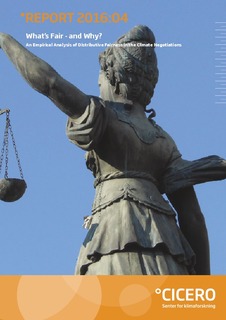What’s Fair – and Why? An Empirical Analysis of Distributive Fairness in the Climate Negotiations
Research report
Permanent lenke
http://hdl.handle.net/11250/2389617Utgivelsesdato
2016Metadata
Vis full innførselSamlinger
- CICERO Reports [210]
Sammendrag
In the climate negotiations, conceptions of fairness plays an important role. For a climate agreement to be effective and durable, it must be conceived as fair by as many of its parties as possible. Unfortunately, there is hardly a consensus in the negotiations on what a fair agreement should constitute, and diverging fairness conceptions are at the heart of the conflicts of the negotiations. This thesis is an attempt at understanding this fairness dimension. It attempts to answer two related questions: 1) what do the parties in the negotiations conceive as fair? And 2) why do parties in the negotiations have differing conceptions of what constitutes a fair agreement?
The findings of this thesis indicate that there has been little progress on reaching a common understanding of fairness in the negotiations over the last five-year cycle of negotiations that concluded with the Paris agreement. Even though a significant potential for compromise exists, key actors’ positions on the fairness dimension are polarized. This might be an explanation for why a burden-sharing approach is no longer possible in the negotiations. Whether a country is listed as “developing” or “developed” in the UNFCCC is the most important explanatory factor for diverging fairness conceptions - indicating that conceptions of fairness are largely driven by self-interest.

